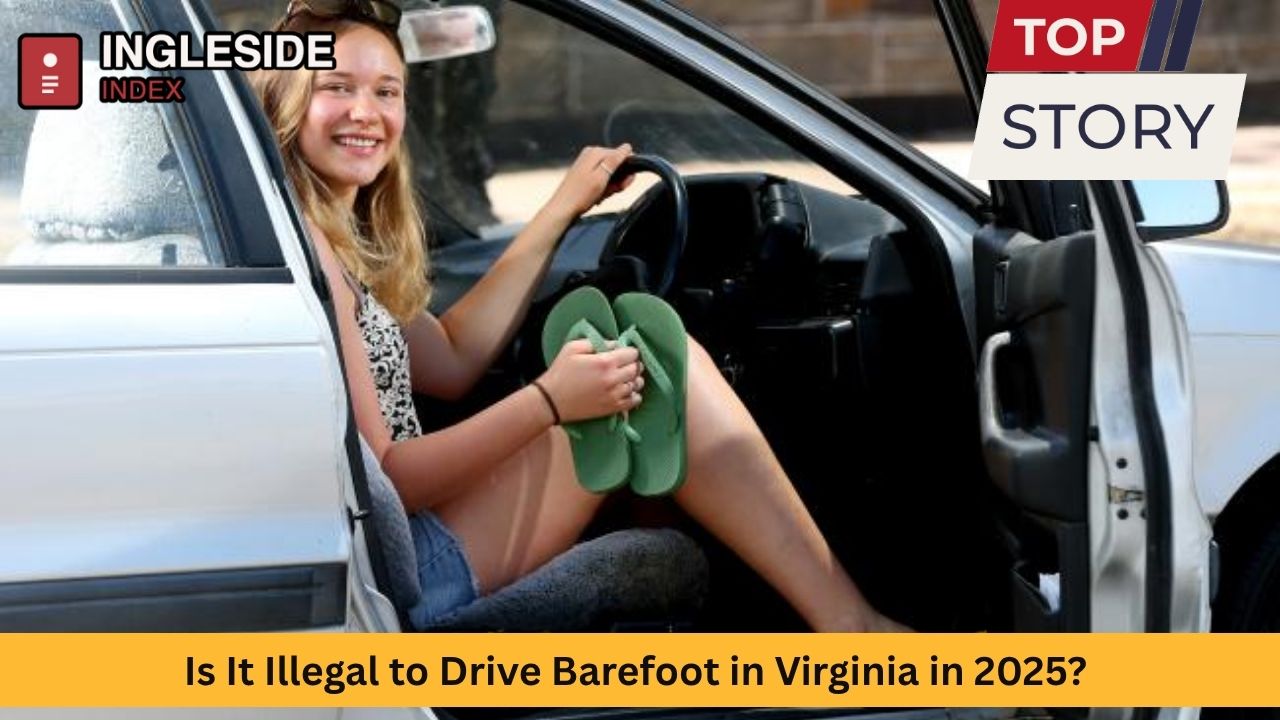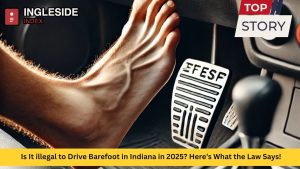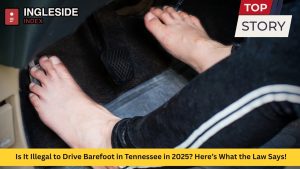Driving habits often spark debate and myths, but few generate as much confusion as the topic of driving barefoot. In Virginia, from the historic avenues of Richmond to the lively downtown of Virginia Beach and the scenic Blue Ridge drives near Roanoke, many motorists wonder: is it illegal to drive barefoot? This comprehensive long-form article clears the air, explores the law, debunks old myths, and closely examines the safety realities and implications in 2025.
Unpacking the Law: Barefoot Driving in Virginia
The Legal Landscape
In Virginia, there are no statutes or state regulations that make it illegal to drive barefoot. The law remains consistent in 2025, as it has in previous years: drivers are not required by any state law to wear any specific type of footwear while operating a personal vehicle. This means whether you’re commuting from Alexandria to Washington, D.C., heading out from Norfolk for a summer weekend, or cruising through Charlottesville’s beautiful countryside, no law prohibits you from slipping off your shoes at the wheel.
Contrary to a common myth, not a single city or locality in Virginia—be it Richmond, Arlington, or Newport News—enforces a rule mandating footwear behind the wheel. This misconception dates back decades and persists due to misinformation and unofficial advice.
Federal and State Guidelines
No federal transportation law requires footwear for driving. Every state, including Virginia, leaves such details to the discretion of drivers. So, if you find yourself driving barefoot along the boardwalks of Virginia Beach or the mountain bends of Harrisonburg, you are not violating any driving law.
Why the Myth Persists: Roots of the Barefoot Driving Legend
The Urban Legend
The notion that barefoot driving is illegal has roots in unofficial warnings from law enforcement, safety instructors, or even parents. Over generations, this guidance transformed into an enduring myth.
Influence of Driver Education
Driver education in schools across Virginia often includes recommendations for safe and stable footwear. Suggestions to avoid sandals, flip-flops, and bare feet are common to promote safety, but these remain exactly that—suggestions, not requirements.
Safety Perspectives: The Barefoot Driving Dilemma
Is It Safe to Drive Without Shoes?
While Virginia law does not prohibit barefoot driving, safety experts generally advise against it. There are real concerns that driving without appropriate footwear can:
-
Decrease grip and control over the pedals, especially if feet are wet or sweaty.
-
Increase the risk of injury if an accident occurs, due to lack of protection.
-
Increase the chance of foot fatigue, particularly on long trips across regions like Fairfax County or Loudoun County.
What the Experts Say
Traffic safety organizations, including the National Highway Traffic Safety Administration (NHTSA), emphasize the importance of maintaining full control of your vehicle at all times. The ability to respond quickly and firmly to unexpected road conditions is paramount in high-traffic cities like Arlington or on winding roads near Abingdon.
Studies indicate that improper footwear or the absence of shoes can be a contributing factor in reduced pedal control, though official statistics around barefoot driving alone remain scarce. Nationally, it’s estimated that up to 94% of car crashes involve some element of driver error or impaired vehicle control, underlining the importance of driver responsibility in all circumstances.
Facts and Statistics: How Many Drive Barefoot in Virginia?
What We Know
No state or federal body routinely collects or publishes specific metrics on barefoot driving. However, informal surveys suggest that a notable number of drivers—especially during the warmer months in cities like Virginia Beach or Williamsburg—occasionally opt to drive without shoes.
Accident Data
While there are no publicized crash statistics directly related to barefoot drivers in Virginia, general findings from the Virginia Department of Motor Vehicles reveal that driver-related factors such as distracted driving and improper vehicle control contribute to the vast majority of traffic collisions each year.
Comparative Overview: Other States and Their Laws
Outside of Virginia, the legal situation is largely the same. No U.S. state bans barefoot driving outright in cars, though a handful—like Alabama for motorcycle riders—require footwear on two-wheeled vehicles. Across the Southeast, including nearby North Carolina and Maryland, the law follows the Virginia model: driving barefoot is legal but not encouraged due to safety reasons.
When Barefoot Driving Could Become a Problem in Virginia
Liability and Accident Responsibility
While removing your shoes behind the wheel is not a criminal or civil offense on its own, being barefoot could become a topic of interest after an accident. If being shoeless is determined to have contributed to a crash—for instance, if your foot slipped off the brake or got fatigued during a long tour on I-81—it could influence your culpability.
Virginia follows a legal doctrine known as contributory negligence. If you, even slightly, contribute to an accident, you might be ineligible to collect damages from other parties involved. Thus, if driving barefoot is deemed to reduce your control or slow your reaction in a critical moment, this detail could affect how liability is distributed in insurance claims or legal proceedings.
Traffic Stops and Reckless Driving Charges
Although law enforcement officers in Richmond, Alexandria, or elsewhere cannot ticket you for simply being shoeless, reckless or distracted driving remains illegal. If your choice of attire—shoes or lack thereof—leads to visibly erratic driving and puts others at risk, a citation or harsher penalty could result.
Common Questions About Barefoot Driving in Virginia
Is It Safer to Drive Barefoot or in Flip-Flops?
Neither option is ideal from a safety standpoint. Flip-flops and sandals are more likely than sneakers to slip off or get jammed under a pedal. Bare feet, though, lack protection and grip.
Are Professional Drivers Affected?
For commercial drivers in Virginia—like taxi, rideshare, or delivery drivers—company or organizational policies might require closed-toe shoes or certain attire. However, these are employment rules, not state laws, and vary across companies in Richmond, Norfolk, or Charlottesville.
Does Insurance Cover Barefoot Driving-Related Accidents?
Insurance policies do not have exclusions for barefoot drivers. However, if lack of footwear is deemed to have contributed to an accident—say, while navigating traffic on the streets of Hampton or during a busy rush hour in Manassas—it could impact claims or settlement negotiations.
Real-Life Scenarios: Barefoot on Virginia’s Roads
A Summer Day in Virginia Beach
During summer, it’s common for residents and tourists to slip off their shoes after a beach visit. Many drive home barefoot, comfortable and relaxed after a day by the waves. In the event of an accident, if authorities find that being barefoot hindered braking or acceleration, this detail might be included in incident documentation.
Commuters in Northern Virginia
Rush hour traffic in bustling cities like Arlington and Fairfax often leads drivers to seek comfort. Some opt for no shoes after a long day in the office, especially when feet are sore or shoes are restrictive. As long as you retain full control of your vehicle, you are not breaking the law.
Exploring the Broader Context: Social Attitudes and Popular Opinions
Public Perception
Despite the legality, many Virginians believe that barefoot driving “just feels illegal.” Social norms continue to influence perceptions, often reinforced by community chatter, word of mouth, or outdated advice.
Cultural Variation Across Cities
Attitudes toward barefoot driving vary by region. Beach towns like Virginia Beach or resort communities near the Shenandoah Valley are more relaxed about shoe mandates, while urban areas such as Richmond, where formal footwear is the daily norm, may be less accepting—culturally if not legally.
Professional Guidance: What Driving Schools and Experts Recommend
Driving Instructors’ Advice
From Roanoke’s driving schools to learning centers in Fairfax, instructors consistently recommend driving in secure, snugly-fitting footwear. Many highlight the following hazards:
-
Reduced braking force and pedal control
-
Increased risk of injury during collisions
-
Discomfort or distraction during long drives
Safety Campaigns
Virginia DMV and local safety campaigns encourage prudent choices, urging drivers to keep a spare pair of suitable shoes in the car, especially when shoes are removed for walking, outdoor activities, or long commutes.
Debunking More Myths Around Barefoot Driving
Myth: Emergency Response Delays
Some believe that being barefoot could delay rescue or medical assistance after an accident. In reality, first responders never delay care based on attire unless safety gear is needed for hazardous conditions.
Myth: Insurance Refusal Due to Bare Feet
Another misconception is that drivers will be denied insurance payment after a crash if found barefoot. Insurance claim reviews focus on the direct cause of the accident, considering many variables such as speed, distraction, impairment, and weather.
Stats in Focus: Road Safety and Contributory Factors
Virginia Crash Data Overview
Each year, thousands of crashes occur on Virginia’s highways, urban streets, and rural roads. Contributing factors include:
-
Distracted driving
-
Improper lane usage
-
Speed
-
Fatigue
-
Weather conditions
While official records from Roanoke, Lynchburg, and Williamsburg police departments cite “driver error” as a frequent factor, they rarely mention footwear as a primary or secondary cause.
National Data Trends
Nationally, the NHTSA attributes nearly 94% of motor vehicle crashes to driver-related factors. While these factors include distraction, fatigue, and impaired control, the agency does not isolate barefoot driving specifically. Nevertheless, loss of control due to any reason—including the absence of shoes—can be grounds for finding a driver liable.
Practical Tips for Virginia Drivers: Staying Comfortable and Safe
What to Keep in Mind
-
Always ensure your feet have good traction on the pedals.
-
Avoid open-backed shoes and loose flip-flops, especially for longer trips or city driving in high-traffic areas like downtown Richmond or the expressways of Norfolk.
-
Consider keeping a pair of athletic shoes or sturdy sneakers in your vehicle.
-
Adjust seat position and awareness if driving barefoot so your feet are springy and responsive.
When to Reconsider Barefoot Driving
Medical professionals note that certain health conditions—like neuropathy or injuries to the foot—could compound risks when driving barefoot. If you experience foot numbness, cramping, or any form of pain, it’s best to wear proper footwear for full control.
Exploring Barefoot Driving on Two Wheels
While most of this discussion revolves around cars, a quick note on motorcycles: In Virginia, riding a motorcycle barefoot is not explicitly banned by law, but both safety and most motorcycle regulations strongly recommend shoes. Across the U.S., some states make it mandatory to wear footwear on motorcycles as an added layer of personal safety.
The Future of Barefoot Driving in Virginia
Could the Law Change?
So far, no legislative proposals have emerged from Richmond or any other city to introduce stricter rules regarding barefoot driving. The state’s approach in 2025 remains focused on overall safety and driver responsibility rather than prescribing dress codes behind the wheel.
Advances in Vehicle Technology
Modern vehicles—especially electric and autonomous cars found increasingly in urban hubs like Alexandria and Charlottesville—feature sensitive pedal controls and advanced safety systems. Nonetheless, these innovations do not offset the need for proper traction and safe driving practice.
Final Thoughts: Comfort, Safety, and Virginia’s Driving Culture
Driving barefoot in Virginia in 2025 is completely legal, whether you’re enjoying the beaches of Norfolk, the rolling hills of Winchester, or the lively culture of Richmond. Still, being legal does not always mean being wise. The safest drivers consider both comfort and responsibility, choosing footwear that supports quick, decisive actions behind the wheel.
Virginia’s roads are for everyone: locals, tourists, commuters, and outdoor adventurers alike. Whether you choose to kick off your shoes or slip on some sneakers, remain vigilant and attentive so you can enjoy every journey safely—barefoot or not.
Quick Reference Table: Barefoot Driving in Virginia
| Aspect | Barefoot Driving Allowed | Notes for 2025 |
|---|---|---|
| Statewide Legality | Yes | No law prohibits barefoot driving |
| City/Town Variation | No | No municipality bans it |
| Commercial Drivers | Varies | Subject to employer policies, not state law |
| Insurance Complications | Possible | Only if being barefoot leads to loss of control in an accident |
| Safety Practice | Not recommended | Grip and protection are better with shoes |
| Accident Liability Impact | Yes | Can be found negligent if bare feet contribute to a crash |
| Motorcycles (All Types) | Not explicitly banned | Strongly advised to wear shoes for safety |
In summary, drive responsibly and comfortably—your safety and the safety of others depend on it, whether you’re wearing boots, sandals, or nothing at all.




